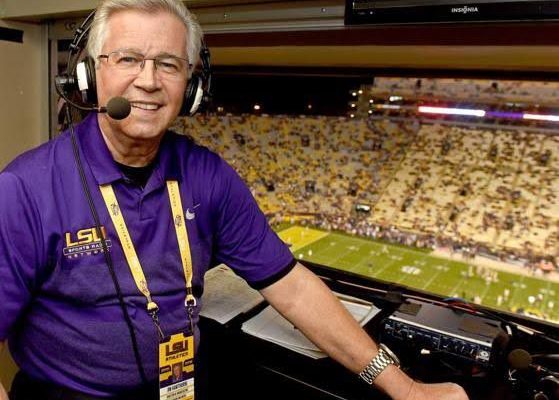When it comes to college sports, there are names that transcend the action on the field, court, or diamond. They are not players who wear the uniforms, nor are they the coaches drawing up plays. Instead, they are the voices who give life to the moments, transforming routine plays into unforgettable memories. One of those voices belongs to Jim Hawthorne, the legendary play-by-play announcer whose tenure with the LSU Tigers became as iconic as the athletes and championships themselves. ESPN has now bestowed upon him one of the greatest honors imaginable in his field, recognizing Hawthorne as the best play-by-play announcer in college sports history, a tribute that both cements his legacy and reminds the sports world of the power of storytelling through sound.
For decades, Jim Hawthorne’s voice was synonymous with LSU athletics. Whether it was football Saturdays in Death Valley, high-stakes basketball showdowns at the Pete Maravich Assembly Center, or thrilling baseball contests at Alex Box Stadium, Hawthorne was the constant companion of generations of Tigers fans. He painted pictures through words in a way that allowed those sitting at home, in their cars, or listening on small radios to feel like they were inside the stadium. Hawthorne had the rare gift of being able to make listeners not only hear but see and experience the moment, his voice rising and falling with the emotions of the game, building tension, and then unleashing joy with the call of a touchdown, a buzzer-beater, or a home run.
Born in Anacoco, Louisiana, Hawthorne grew up immersed in the local sports culture, and though he initially pursued other career avenues, his path led him into radio and eventually into the heart of LSU athletics. When he took over as the full-time voice of the Tigers in the late 1970s, he immediately set a tone that resonated with fans. It wasn’t about being flashy or over-the-top; it was about authenticity, accuracy, and capturing the heartbeat of the game. His delivery had a cadence that mirrored Louisiana’s cultural rhythm: steady, soulful, and unpretentious. As LSU rose to national prominence in multiple sports, his calls became the soundtrack of victories and heartbreaks alike.
What made ESPN’s recognition of Hawthorne so remarkable is the context of college sports broadcasting itself. Unlike professional franchises that often have high-profile, nationally syndicated voices, college announcers typically speak to a more regional, sometimes niche audience. Yet Hawthorne’s reach expanded far beyond Baton Rouge and the state of Louisiana. His calls were replayed on national highlight shows, and his reputation as a consummate professional spread throughout the sports broadcasting industry. Fans from rival schools recognized his excellence, and colleagues admired his ability to let the game breathe while still infusing his unique passion into every call.
One cannot talk about Jim Hawthorne’s legacy without mentioning the unforgettable games he narrated. When LSU football achieved its national championship glory in 2003 and 2007, Hawthorne’s calls etched those moments deeper into memory. Listeners recall his voice breaking with excitement as LSU toppled Oklahoma in the Sugar Bowl or when the Tigers dominated Ohio State to claim the crystal football. In basketball, he was there for the electrifying moments of Shaquille O’Neal’s career, capturing the dominance of one of the sport’s all-time greats before he became an NBA legend. On the baseball diamond, his voice carried the emotion of LSU’s multiple national championships, further proving that his connection to the Tigers extended to every corner of the athletics department.
What separated Hawthorne from others was not simply his talent but his devotion to the LSU community. For many Tigers fans, especially in the years before games were easily accessible on national television, Hawthorne’s broadcasts were the lifeline to their team. He wasn’t just describing the game; he was sharing it with families sitting around radios on porches, with alumni spread across the country, and with students crowded in dorm rooms. His warmth and accessibility made him more than a broadcaster. He became a family member, the trusted companion who could deliver joy on a Saturday night or empathy in the face of defeat.
The ESPN honor also serves as recognition of an era in sports broadcasting that is becoming increasingly rare. In today’s landscape, with national networks covering almost every game and streaming services giving fans unlimited access, the role of the local play-by-play announcer has changed. Yet, in Hawthorne’s time, his voice was the one that defined how fans experienced LSU athletics. His ability to rise to the occasion with calls that felt monumental but never forced demonstrated why he stood above the rest. He was never trying to become the star of the broadcast. Instead, he served as the bridge between the action on the field and the emotions of the fans, a quality that ESPN emphasized in their glowing recognition of his career.
Hawthorne’s retirement in 2016 was an emotional moment for the LSU family. His final season was celebrated with tributes and acknowledgments from across the sports world. Players, coaches, and fans all shared how much he meant to them. It was a farewell tour that underscored how deeply woven into the LSU identity he had become. Even as newer voices stepped into his role, none could ever truly replicate what he brought to the microphone. The ESPN accolade years later is not just about honoring the past but ensuring that future generations understand the weight of his contributions.
Another critical aspect of Hawthorne’s greatness lies in his adaptability and consistency. College athletics evolve quickly, with players cycling in and out, coaches coming and going, and programs rising and falling. Yet Hawthorne remained a steadying force throughout decades of change. He covered the highs and lows with equal professionalism, never letting personal bias overshadow his calls, even though his love for LSU was undeniable. That balancing act is a rare art in sports broadcasting—being both the voice of the home team while maintaining credibility and respect across the wider sports landscape.
The award from ESPN is also symbolic of the broader importance of play-by-play announcers in college sports. They often do not receive the national spotlight, but their impact is immeasurable. They are the historians of the programs, the ones who chronicle the journey of teams and athletes. For LSU, Jim Hawthorne was more than just a chronicler; he was part of the team itself. Without his voice, so many of the Tigers’ greatest moments would lack the same emotional resonance. Fans can still recall his exact tone during iconic plays, and those memories have become as lasting as the highlights themselves.
Hawthorne’s story also highlights the importance of local culture in shaping sports identity. Louisiana has a rich tradition of storytelling, music, and oral history, and in many ways, Hawthorne’s broadcasting style reflected that heritage. He was a narrator in the truest sense, weaving emotion and detail together to create a complete picture. His voice, with its familiar southern drawl, carried the authenticity of the region, making LSU athletics not just a sport but a cultural experience. ESPN’s recognition validates not only his work but the broader role of cultural identity in sports broadcasting.
As the sports world celebrates Jim Hawthorne’s honor, it also prompts reflection on the role of legacy. For young broadcasters entering the industry, Hawthorne’s career serves as a model of how to build trust, longevity, and impact. It wasn’t about gimmicks or viral moments. It was about dedication, preparation, and a genuine love for the craft. He showed that a play-by-play announcer’s greatest asset is the ability to connect with listeners, to make them feel the game even when they cannot see it. That is why, even years after his retirement, his name still carries immense weight, and his calls still stir emotions in those who hear them.
ESPN’s honor of Jim Hawthorne as the best play-by-play announcer in college sports is more than just an award. It is an acknowledgment of a lifetime of work that shaped the identity of LSU athletics and enriched the experience of countless fans. It is a celebration of the power of voice, of storytelling, and of tradition. For LSU faithful, it is validation of what they have always known: that their beloved “Voice of the Tigers” was truly one of a kind. And for the broader sports world, it is a reminder that sometimes the greatest legends in sports are not those on the field but those whose voices bring the games to life.



